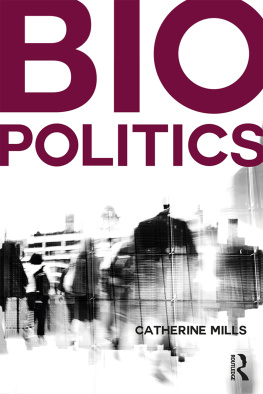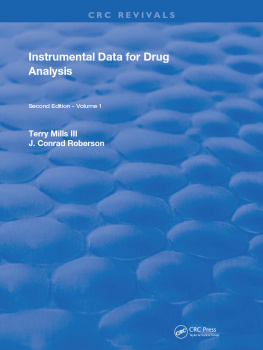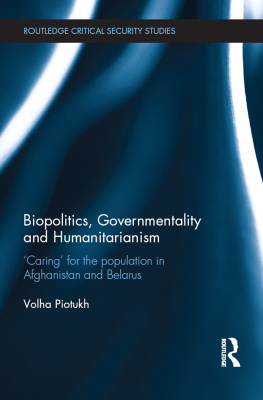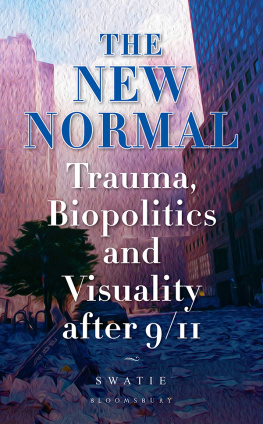Mills - Biopolitics
Here you can read online Mills - Biopolitics full text of the book (entire story) in english for free. Download pdf and epub, get meaning, cover and reviews about this ebook. City: London New York, year: 2018, publisher: Routledge;Taylor & Francis Group, genre: Religion. Description of the work, (preface) as well as reviews are available. Best literature library LitArk.com created for fans of good reading and offers a wide selection of genres:
Romance novel
Science fiction
Adventure
Detective
Science
History
Home and family
Prose
Art
Politics
Computer
Non-fiction
Religion
Business
Children
Humor
Choose a favorite category and find really read worthwhile books. Enjoy immersion in the world of imagination, feel the emotions of the characters or learn something new for yourself, make an fascinating discovery.
Biopolitics: summary, description and annotation
We offer to read an annotation, description, summary or preface (depends on what the author of the book "Biopolitics" wrote himself). If you haven't found the necessary information about the book — write in the comments, we will try to find it.
Biopolitics — read online for free the complete book (whole text) full work
Below is the text of the book, divided by pages. System saving the place of the last page read, allows you to conveniently read the book "Biopolitics" online for free, without having to search again every time where you left off. Put a bookmark, and you can go to the page where you finished reading at any time.
Font size:
Interval:
Bookmark:

Biopolitics
The concept of biopolitics has been one of the most important and widely used in recent years in disciplines across the humanities and social sciences. In Biopolitics , Mills provides a wide-ranging and insightful introduction to the field of biopolitical studies. The first part of the book provides a much-needed philosophical introduction to key theoretical approaches to the concept in contemporary usage. This includes discussions of the work of Michel Foucault, Giorgio Agamben, Hannah Arendt, Roberto Esposito, and Antonio Negri. In the second part of the book, Mills discusses various topics across the categories of politics, life, and subjectivity. These include questions of sovereignty and governmentality, violence, rights, technology, reproduction, race and sexual difference.
This book will be an indispensable guide for those wishing to gain an understanding of the central theories and issues in biopolitical studies. For those already working with the concept of biopolitics, it provides challenging and provocative insights and argues for a ground-breaking reorientation of the field.
Catherine Mills is Associate Professor of Bioethics and an Australian Research Council Future Fellow at Monash University, Australia.
Biopolitics
Catherine Mills

First published 2018
by Routledge
2 Park Square, Milton Park, Abingdon, Oxon OX14 4RN
and by Routledge
711 Third Avenue, New York, NY 10017
Routledge is an imprint of the Taylor & Francis Group, an informa business
2018 Catherine Mills
The right of Catherine Mills to be identified as author of this work has been asserted by her in accordance with sections 77 and 78 of the Copyright, Designs and Patents Act 1988.
All rights reserved. No part of this book may be reprinted or reproduced or utilised in any form or by any electronic, mechanical, or other means, now known or hereafter invented, including photocopying and recording, or in any information storage or retrieval system, without permission in writing from the publishers.
Trademark notice : Product or corporate names may be trademarks or registered trademarks, and are used only for identification and explanation without intent to infringe.
British Library Cataloguing-in-Publication Data
A catalogue record for this book is available from the British Library
Library of Congress Cataloging-in-Publication Data
Names: Mills, Catherine, 1972- author.
Title: Biopolitics / Catherine Mills.
Description: First edition. | Abingdon, Oxon; New York, NY: Routledge, 2018. | Includes bibliographical references and index.
Identifiers: LCCN 2017020758 (print) | LCCN 2017037629 (ebook) | ISBN 9780203732588 (E-book) | ISBN 9781844656042 (hardback: alk. paper) | ISBN 9781844656059 (pbk.: alk. paper) | ISBN 9780203732588 (ebook)
Subjects: LCSH: Biopolitics-Philosophy.
Classification: LCC JA80 (ebook) | LCC JA80 .M55 2018 (print) |
DDC 320.01-dc23
LC record available at https://lccn.loc.gov/2017020758
ISBN: 978-1-844-65604-2 (hbk)
ISBN: 978-1-844-65605-9 (pbk)
ISBN: 978-0-203-73258-8 (ebk)
Typeset in Sabon
by Deanta Global Publishing Services, Chennai, India
Contents
As I have been reading, thinking and writing about biopolitics for my entire academic career, too many people have contributed directly or obliquely to this project to thank them all by name. That said, I do wish to acknowledge my professional and intellectual debt to several people who have been especially supportive of or inspiring for me over the years. These are: Robert Bernasconi, Judith Butler, Penelope Deutscher, Rosalyn Diprose, Fiona Jenkins, Paul Patton, Catherine Waldby and Elizabeth Wilson. In addition, I have particularly enjoyed and benefited from conversations with, and the written work of, Melinda Cooper, Mick Dillon, Thomas Lemke, Chris Mayes, Daniel McLoughlin, Sergei Prozorov, Miguel Vatter and Jess Whyte. I am particularly indebted to Niamh Stephenson for her generosity and intellectual openness. My partner, Rob Sparrow, read the entire first draft a true labour of love in which there was little reward or pleasure for him. I am grateful for his critical comments; I am also grateful for his support and encouragement in (academic) life more generally. I wish to dedicate this book to my daughters, who interrupted it with their births and then every day henceforth. Because of them, this book is a testament to life rearranged.
incorporate material previously published in the following places: Mills, C. (2017). Biopolitics and Human Reproduction. The Routledge Handbook of Biopolitics , Eds. Prozorov, S. and Rentea, S. London, Routledge: 28194. Mills, C. (2016). Biopolitics and the Concept of Life. Biopower: Foucault and Beyond . Eds. Morar, N. and Cisney, V. Chicago, University of Chicago Press: 82101. Mills, C. Review of Agamben and Colonialism . Eds. Svirsky, M. and Bignall, S. Edinburgh: Edinburgh University Press. in Critical Philosophy of Race, 4:1, pp.139142.
Finally, the completion of this book has been made possible by the grant of an Australian Research Council Future Fellowship (FT120100026).
Since Michel Foucaults crucial articulation in the 1970s, and the subsequent publication of Giorgio Agambens Homo Sacer (1998) in English, biopolitics has become indispensable as a theoretical point of reference in disciplines across the humanities and social sciences. Now, it seems that few fields are immune to the biopolitical. Further, derivations of the term, such as biolegalities, biocultures, biosociality and biocapital, are instigating and defining new fields of scholarship. This analytic fecundity no doubt arises at least partly from the fact that the concept seems to capture crucial aspects of the workings of the modern and, perhaps, pre-modern world. It is also enhanced by the fact that there are multiple theoretical accounts of biopolitics: the term itself may entail different theoretical commitments, different interpretive emphases and different problems to be resolved or overcome at the levels of philosophy and political activism. This allows for a certain analytic flexibility while also encouraging scholarship that attempts to resolve conflicts in favour of one view or another, or that attempts to redress and rectify the blind spots and shortcomings of the various and competing dominant theoretical approaches.
However, while undoubtedly productive, the dissemination of biopolitics and its cognate terms has also led to a situation of considerable conceptual confusion. With so many different inflections of the term in currency, it is difficult to know just what biopolitics actually refers to, what it means, and, indeed, just what kind of concept it is. To get a clearer sense of this, it is possible to broadly categorize the different ways of understanding and using the concept of biopolitics in contemporary literature as either empirical-descriptive or critical-normative in their basic orientation. These broad categorizations are not strictly mutually exclusive; rather, they inter-relate in various ways, in, for instance, the way that an empirical-descriptive account of biopolitics might also lead to or suggest some critical-normative conclusions or commitments. Even so, identifying these different inflections helps to articulate the theoretical commitments of various contributors to the contemporary debates, and, at times, provides leverage for a critical assessment of their contribution. Further, within each broad categorization, there are also several variant uses of the term.
The empirical-descriptive inflection of the concept rests on the claim that there is an identifiable historical phenomenon, or set of phenomena, that is well-described and analyzed with reference to the concept of biopolitics. While most, if not all, versions of biopolitics have some empirical resonance, the most well-known example of this approach is Michel Foucaults early formulation of biopolitics, and the related notion of biopower, in his work in the mid-1970s. Thus, in Will to Knowledge (1990) the first volume of the History of Sexuality series and contemporaneous lectures at the Collge de France, Foucault posits that biopower emerged as a particular rationality of power in the eighteenth century. This rationality of power is distinguished from sovereign power in various ways, but in particular, it places the new political subject of the population at the centre of governmental calculations, and one of its key problematics is the fostering of life through the political conjunction of the individual and the population. In this and other aspects, Foucault claimed that biopower was deeply integrated with the governmental rationality of liberalism. In this view, biopolitics or biopower is something that happened, and is perhaps still happening, and its machinations and effects can be traced through detailed historical, social and political studies.
Font size:
Interval:
Bookmark:
Similar books «Biopolitics»
Look at similar books to Biopolitics. We have selected literature similar in name and meaning in the hope of providing readers with more options to find new, interesting, not yet read works.
Discussion, reviews of the book Biopolitics and just readers' own opinions. Leave your comments, write what you think about the work, its meaning or the main characters. Specify what exactly you liked and what you didn't like, and why you think so.















